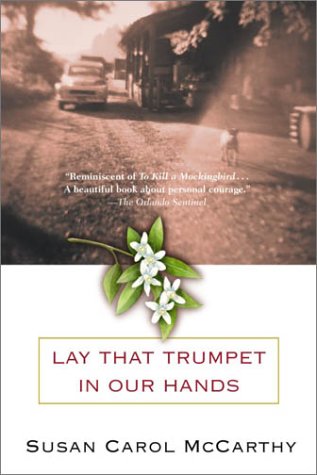All Nonfiction
- Bullying
- Books
- Academic
- Author Interviews
- Celebrity interviews
- College Articles
- College Essays
- Educator of the Year
- Heroes
- Interviews
- Memoir
- Personal Experience
- Sports
- Travel & Culture
All Opinions
- Bullying
- Current Events / Politics
- Discrimination
- Drugs / Alcohol / Smoking
- Entertainment / Celebrities
- Environment
- Love / Relationships
- Movies / Music / TV
- Pop Culture / Trends
- School / College
- Social Issues / Civics
- Spirituality / Religion
- Sports / Hobbies
All Hot Topics
- Bullying
- Community Service
- Environment
- Health
- Letters to the Editor
- Pride & Prejudice
- What Matters
- Back
Summer Guide
- Program Links
- Program Reviews
- Back
College Guide
- College Links
- College Reviews
- College Essays
- College Articles
- Back
Lay That Trumpet in Our Hands by Susan McCarthy
Before creating the masterpiece, True Fire, Susan McCarthy wrote another well-written novel, Lay that Trumpet in Our Hands, for the world. In this new poignant tale of seeking justice upon the KKK after the cold-hearted murder of an innocent boy, Susan McCarthy incorporates her experiences as a child of independent citrus growers raised in central Florida, historic events, and her evocative imagination. Filled with a wide variety of figurative language, vivid imagery, and pertinent diction, Lay that Trumpet In Our Hands is a novel that tells an amazing story about the courage of people standing up for what they believe is right and is a story recommended for both teenagers and adults alike.
McCarthy begins her novel with the gruesome murder of Marvin Cully, an African American boy. The KKK members believed that “the boy was an animal, a dog to be put out of its misery” (McCarthy 23). Witnessing the death of her closest friend, Reesa, the young narrator of the novel goes through emotional struggles as she questions the reason for Marvin's death. Throughout the novel, Susan creates fascinatingly complex characters and allows the reader to step into the shoes of these characters. The author depicts the growth and maturity of Reesa when Reesa realizes that she has been too ignorant to notice the “Whites Only, No Coloreds!” sign above the water fountain that she frequently drank from. Reesa felt a “bee sting of shame” and vowed to never drink from that fountain again (57). Susan also uses flawless dialogue and allows the reader to read Reesa's internal thoughts through her syntactical choice of italicizing these thoughts. When Reesa passes by Mr. Emmett Casselton's private office, her “thoughts, like arrows, fly at Casselton's wide-open windows,” and she curses, “A truckload of shame on you…” (58).
Lay that Trumpet in Our Hands also tells about the courage of Reesa's father, Warren. Susan McCarthy portrays the man as a determined person who is willing to risk his life to bring justice upon the KKK and the put an end to the racial prejudice, injustice, and violence against the black community. Filled with the KKK's acts of terrorism, the novel clearly reveals the setting of the 1950s and the racism present at the time period. The author successfully incorporates the historical events and figures of that time and her own memories growing up in central Florida where the story is set to create an authentic novel.
Similar Articles
JOIN THE DISCUSSION
This article has 0 comments.

